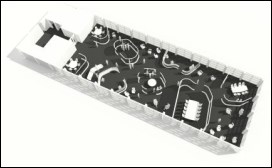by Shane Henson — December 4, 2013—Business Interiors by Staples, the furniture and interior design division of Staples Advantage, and Metropolis, the magazine of architecture, culture and design, recently announced the winners of the Workplace of the Future design competition to showcase the work of architecture and design visionaries who are bringing to life office spaces that better meet the needs of employees.
More than 200 architects and designers entered the competition. According to Business Interiors by Staples, many of the entries focused on:
- Reclaiming urban space: Capitalizing on vacant building spaces in cities to provide workplaces for businesses, traveling workers, and anyone in need of a productive work environment
- Re-imagining office furniture: Rethinking the way furniture is designed to facilitate mobile, pop-up workstations with self-sufficient, self-powering capabilities and interactive technology interfaces
- Employee-centric design: Creating all-encompassing workplace environments that consider employee comfort and health as well as sustainability
- Hyper-collaboration: Pushing workspace layouts beyond conventional collaborative models to focus on interdisciplinary, multicompany and multifunctional arrangements that take the co-working trend to the next level
Business Interiors by Staples awarded the winner, Joe Filippelli of Seattle, Washington, $7,500 for his Vertical Flux concept that radically re-imagines office space as a series of atmospheres where occupant comfort and health are at the forefront. This new approach focuses on thermal comfort made possible by advances in technology, as well as natural properties of temperature and light, to create fluctuating environments and comfort zones.
The runner-up, a team of designers from Eckhart Interior Design (Rotterdam, Netherlands) led by director Teun van den Dries, received $2,500 for CoLAB— its digital re-envisioning of the classic corporate office. The CoLAB office of the future incorporates technology in a way that allows employees to work at any location throughout the office, collaborating with co-workers in any imaginable configuration.

While only two people could walk away as winners of the competition, Susan S. Szenasy, editor-in-chief of Metropolis magazine, was thrilled to see so many exceptional creative designs about working in a tech society from both young and established firms.
“I was gratified to see how many firms, both young and mature, entered the competition and presented many excellent ideas about working in a tech society. The winner, of course, blew us all away, not only with his mature ideas but because of his youth—he is of the generation of architects that will, literally, give shape to the 21st century,” said Szenasy. “He took a broad, systemic look at working and re-imagined the container of work itself, the whole building, from inside out. What’s even more exciting about his proposal is that everything he suggests can be done today; we don’t need to wait for 2020. The future is actually happening now!”




